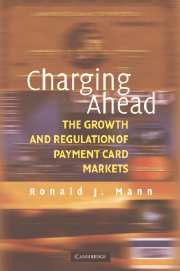Book contents
- Frontmatter
- Contents
- Figures and Tables
- Acknowledgments
- Introduction
- PART I THE BASICS OF PAYMENT CARDS
- PART II EASY MONEY
- PART III THE PUZZLE OF PAYMENT CARDS
- PART IV REFORMING PAYMENT SYSTEMS
- PART V OPTIMIZING CONSUMER CREDIT MARKETS AND BANKRUPTCY POLICY
- 15 Causation, Consumer Credit and Bankruptcy
- 16 Regulating Consumer Credit Markets
- 17 Consumer Bankruptcy Reform
- Conclusion
- Appendix: Country-Level Data
- Notes
- Bibliography
- Index
16 - Regulating Consumer Credit Markets
Published online by Cambridge University Press: 06 July 2010
- Frontmatter
- Contents
- Figures and Tables
- Acknowledgments
- Introduction
- PART I THE BASICS OF PAYMENT CARDS
- PART II EASY MONEY
- PART III THE PUZZLE OF PAYMENT CARDS
- PART IV REFORMING PAYMENT SYSTEMS
- PART V OPTIMIZING CONSUMER CREDIT MARKETS AND BANKRUPTCY POLICY
- 15 Causation, Consumer Credit and Bankruptcy
- 16 Regulating Consumer Credit Markets
- 17 Consumer Bankruptcy Reform
- Conclusion
- Appendix: Country-Level Data
- Notes
- Bibliography
- Index
Summary
Most credit transactions are value-increasing for all parties. Notwithstanding the relation between an increase in borrowing and an increase in financial distress, the overwhelming majority of borrowers successfully repay their debts. Lenders in free markets presumably profit from most of those transactions, and borrowers presumably profit from almost all of them. Borrowers would profit from all of them if it were not for the likelihood that some borrowing transactions reflect poor judgment even if the borrower ultimately obtains the funds to repay the loan.
Moreover, many transactions will be valuable not only for the parties that participate in them, but for third parties as well. They will generate positive externalities, because the expenditures indirectly support the manufacturing and service sectors of the economy. Thus, as discussed in Chapter 15, there is some reason to expect a positive relation between increases in household indebtedness at one point in time and consumer expenditures and gross domestic product some years later. The goal, then, is to identify policies that burden the transactions most likely to impose costs on the rest of society, without imposing hurdles on the value-increasing transactions that reflect the bulk of consumer expenditures and borrowing.
As Part IV explains, some of the instrument-induced risk associated with the credit card could be managed by shifting payment transactions away from credit cards to other electronic payment systems (primarily debit cards).
- Type
- Chapter
- Information
- Charging AheadThe Growth and Regulation of Payment Card Markets around the World, pp. 188 - 197Publisher: Cambridge University PressPrint publication year: 2006

